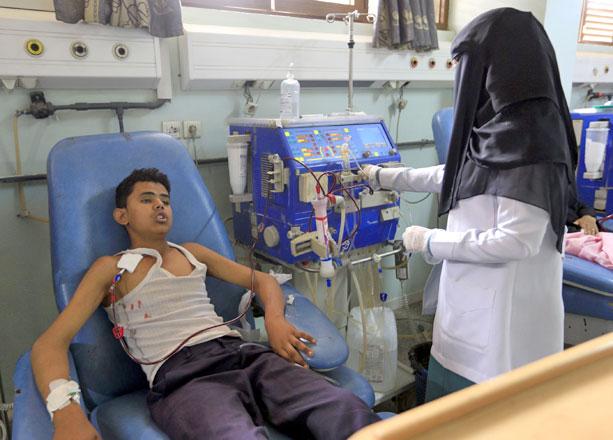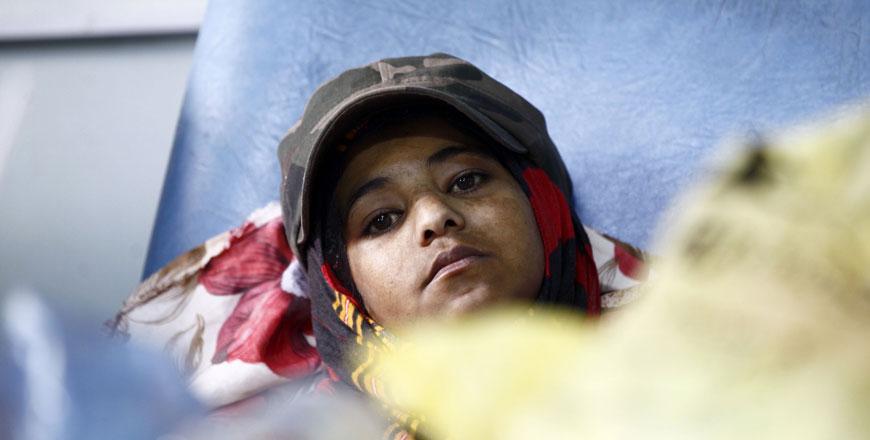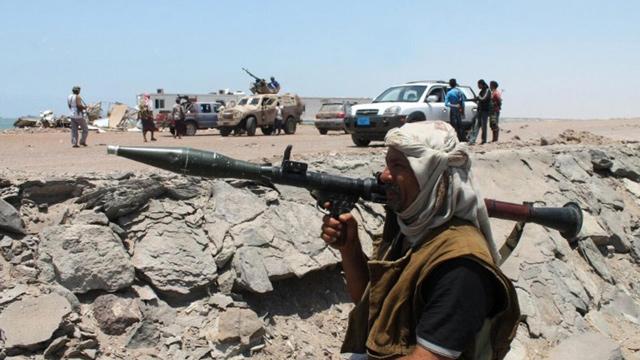You are here
‘Some Saudi-led coalition air strikes in Yemen may amount to war crimes’
By Reuters - Aug 29,2018 - Last updated at Aug 29,2018

A Yemeni boy suffering from kidney failure receives dialysis treatment in the capital Sanaa on Tuesday. All sides in Yemen’s bloody conflict may have committed war crimes, UN investigators said today, highlighting deadly air strikes, rampant sexual violence and the recruitment of young children as soldiers (AFP photo)
GENEVA — Air strikes by the Saudi-led coalition in the war in Yemen have caused heavy civilian casualties and some may amount to war crimes, UN human rights experts said on Tuesday.
The experts’ panel also said that fighters of the rebel Houthi movement had fired missiles into Saudi Arabia and shelled the Yemeni city of Taiz. It accused them of committing torture and deploying child soldiers, both war crimes.
Saudi Arabia is leading a Western-backed alliance of Sunni Muslim Arab states trying, to restore the internationally recognised government of Yemeni President Abed Rabbo Mansour Hadi, ousted from the capital Sanaa by the Iran-aligned Houthis in 2015.
The experts said they did not examine the United States and Britain, who supply weapons and intelligence to the alliance, or Iranian support for the Houthis, but other UN bodies were doing so. They urged all states to restrict arms sales to help end the war.
“I think it fair to say, that of those parties that we have investigated — and we have not been able to look at for example Al Qaeda and Daesh who are also involved in Yemen — of those parties, none have clean hands,” panel member Charles Garraway told a news conference.
In Washington, US Secretary of Defence Jim Mattis said US support for the Saudi-led coalition was not unconditional, but suggested the United States would continue to support the alliance as it works to reduce fallout on civilians.
The US goal was to “keep the human cost of innocents being killed accidentally to the absolute minimum” and to bring the warring parties to the negotiating table, Mattis told reporters.
The report was the first United Nations investigation into possible war crimes in Yemen, although international human rights groups have regularly documented abuses. It was released ahead of UN peace talks between Hadi’s government and Houthis scheduled for September 6 in Geneva.
More than 10,000 people have been killed in the war in Yemen and 8.4 million are on the brink of famine, the panel said.
“Coalition air strikes have caused most of the documented civilian casualties. In the past three years, such air strikes have hit residential areas, markets, funerals, weddings, detention facilities, civilian boats and even medical facilities,” it said.
Coalition forces have imposed severe restrictions on Red Sea ports and Sanaa airport, depriving Yemenis of vital supplies, which may also constitute international crimes, the experts said.
United Arab Emirates (UAE) personnel and proxy forces that are part of the coalition have raped detainees and migrants, they said.
The Saudi-led coalition said it had referred the UN report to its legal team for review.
“The coalition will take an appropriate position on this matter and make an announcement about it once the legal team submits its observations,” it said in a statement.
UAE Minister of State for Foreign Affairs Anwar Gargash said the report merited a response. But he added the region needed to be preserved from “Iranian encroachment”.
Houthi officials could not immediately be reached for comment.
Targeting process
The panel said its investigation of 11 incidents raised serious concerns about the coalition’s targeting process.
Attacks that fail to spare people or structures protected by international humanitarian law would be unlawful violations, it said. But its investigation showed that field commanders “routinely failed to consult with those in the [coalition] joint command holding information about the no-strike lists”.
Garraway said that despite requests, the panel had not been given full access to the coalition’s targeting process, making it extremely difficult to reach firm conclusions.
Panel chairman, Kamel Jendoubi, said three bombs hit a fish market near a hospital in Hodeidah on August 2, killing 40-55 people. The coalition has denied responsibility.
“It would seem that the strikes came from the south, where the Emirati forces and forces of President Hadi are concentrated, near the airport,” Jendoubi said.
Related Articles
RIYADH — Saudi-led air strikes killed 41 civilians and wounded 75 others on Tuesday in Yemen's northwestern province of Haja, a senior provi
WASHINGTON — The US military signalled on Tuesday it would continue its assistance to the Saudi-led coalition fighting in Yemen, even as it
RIYADH — Yemen is wracked by a war which has killed tens of thousands of people and led to the world's worst humanitarian crisis, according
















